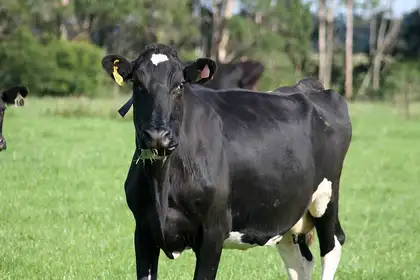
The facility will help to attract new research partners and deepen existing relationships with industry and communities.
A Massey University dairy farm will host new joint research facilities that will focus on improvements across a range of critical issues, from animal welfare to climate change and environmental impacts.
Work has just begun on the development of a new joint dairy research facility between Massey University and AgResearch on Dairy 4 farm, the largest of two dairy farms owned by the university near the Manawatū campus.
Dairy 4 farm is a 220 hectare commercial, research and teaching farm with approximately 600 spring calving cows.
The new facilities will boast two rotary milking platforms which will allow detailed research projects to take place alongside the farm’s daily operations. Other new facilities include a covered veterinary area for individual cow measurements and a multi-lane feed pad to enable differential feeding to various groups of cows. There will also be an effluent treating system, a data centre within the shed to store and manage research data, a teaching room and biosecurity station.
Professor Peter Kemp of the School of Agriculture and Environment says the new facilities will help Massey to build on its reputation of contributing world leading pure and applied research, in partnership with industry, on matters that are of national and international interest including environmental impacts of climate change, biosecurity issues, animal welfare issues and economic threats posed by innovations in food production.
He says the partnership will enable greater interaction between Massey and AgResearch staff and students and allow a range of independent trials to operate at any one time.
“These high quality and fit-for-purpose facilities will improve the flexibility in our programme delivery and content, while also helping to attract new researchers, staff and students.”
He says new facilities will attract new research partners and deepen existing relationships with industry and communities, nationally and internationally.
AgResearch Research Director Dr Trevor Stuthridge says investing with the university in the development of Dairy 4 farm was identified some years ago as part of the strategic development of science capability at AgResearch’s Grasslands campus.
“The farm’s proximity to Te Ohu Rangahau Kai, a world-class joint food science facility based at the university, and connections with FoodHQ will increase the linkages of research programmes across the whole supply chain from producer to consumer.
“New Zealand communities and farmers will benefit from this significant investment into the future of farm-scale science research. It underpins the close relationship and collaboration between AgResearch and Massey, two significant land-based science institutions,” Dr Stuthridge says.
The new facilities will be developed on a greenfields site, so construction will not impact on the farm's operations and existing research activities underway. Completion is scheduled for winter 2021.
The Dairy 4 farm is well known for its research into nutrient losses on heavy soils and recent collaborative work on partial housing systems for dairy cows. It hosts a large number of visitors each year and is used often by agricultural and veterinary students at Massey.
Further information
Dairy 4 farm has been operating for approximately 46 years and complements Dairy 1 farm, a 260-cow farm beside the Manawatū River that can be seen from the Fitzherbert Bridge. AgResearch has a range of research farms across New Zealand and has also partnered with DairyNZ and southern dairy farmers in the new Southern Dairy Hub, a large-scale research dairy farm in Southland.
Te Ohu Rangahau Kai is the combination of the complementary sets of expertise from AgResearch, the Riddet Institute and Massey University, combining the Riddet Institute’s strengths in high quality food science and future capability, with AgResearch’s strengths in technology and innovation to support New Zealand’s exports. Te Ohu Rangahau Kai ensures increased collaboration between scientists, working in a facility that features high-quality workspaces, laboratories, teaching spaces and state of the art equipment to tackle some of the biggest issues of our age, including a secure and safe food supply whilst also increasing our support for the wellbeing of all New Zealanders.